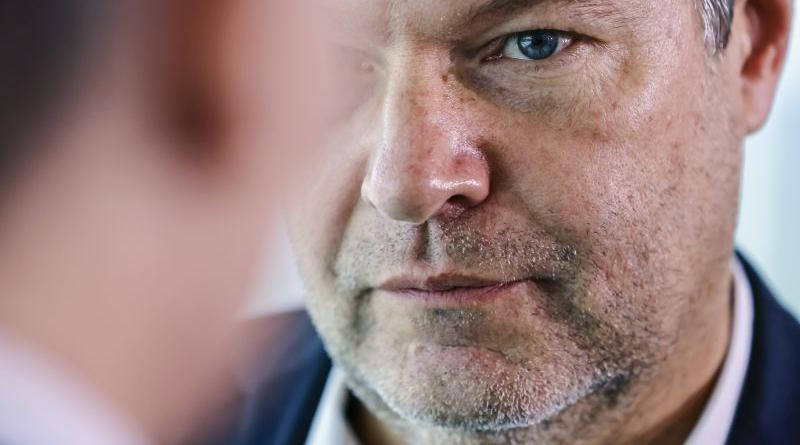Germany on collision course with France, Spain over EU power market reform

Three weeks before the European Commission tables its proposal to reform the EU’s electricity market, Germany’s position on the issue is still being fleshed out but initial signs already point to a looming clash with pro-reform countries like France and Spain.
The Commission is currently preparing a review of EU electricity market rules, arguing that the EU power market “does not work anymore” and needs to be adapted to the “new realities of dominant renewables” and higher gas prices.
European Commission President Ursula von der Leyen has made the reform a priority, with a concrete proposal expected on 14 March.
But while France and Spain are pushing for reform, Germany has decided to defend the status quo.
According to Berlin, the spike in electricity prices seen in 2022 was the result of extraordinary circumstances caused by falling gas supplies from Russia, not by faulty market design.
“Europe has one of the best functioning electricity markets in the world,” said Robert Habeck, Germany’s minister of economy and climate action.
“We must preserve the positive achievements while making the market fit for the future,” he added on Monday (20 February) during an event in Berlin to mark the beginning of a nation-wide consultation on the reform.
In a speech to energy CEOs, experts and think-tankers in Berlin, Habeck highlighted Germany’s role as the “heart chamber” of the European electricity market before laying out the country’s priorities for reform.
Priority number one for the new market design will be to ensure that there are sufficient incentives to invest in renewables. “How will renewables be financed?” Habeck asked, adding that ensuring “low prices” are passed through to consumers will be paramount for Germany.
Second, Berlin will aim to ensure sufficient flexible power generation capacity is available at all times to ensure back-up for intermittent renewable energies. Here, plants burning hydrogen and gas are expected to play a key role, he indicated, saying Germany would need “about 20%” of the country’s power generation capacity to “burn molecules”.
Third, the design should work towards achieving greater flexibility on the electricity demand side, a challenge Habeck described as “teaching the elephant to dance”. Fourth, electricity production should increasingly be tackled locally, he said.
Germany, a massive country, is made up of a single electricity pricing zone, where southerners in Bavaria often consume wind power produced in the North Sea.
Other big countries like Sweden have at least six pricing zones where bidders buy and sell on the day-ahead market to set prices within the zone. But in Germany, splitting the bidding zones could have far-reaching economic repercussions on the industrious south, and has been resisted until now for political reasons.
So, the German government must find a way to ensure electricity is produced locally, otherwise it will be forced to split the bidding zones, as proposed by the EU agency ACER in 2022.
“The European Commission has announced that it will itself submit proposals on electricity price zones, in the year 2024 at the latest,” Habeck warned, pointing to the urgency of moving forward on this matter.
These challenges will be debated by experts on a stakeholder platform for a “climate neutral electricity system” which will begin work immediately. Their first conclusions are expected in the summer of 2023, followed by a winter report.
At the end of this process, Germany will adopt its official stance on the EU’s electricity market reform.
However, this could be too late for Brussels and pro-reform countries like France, Spain and Greece, which all want the reform to be concluded before the European elections in spring next year.
Luxembourg supports German approach
Germany’s cautious approach is backed by six other countries – Denmark, Estonia, Finland, Luxembourg, Latvia and the Netherlands.
Last week, they sent a letter to the European Commission calling for the electricity market reform to be “targeted” and focused on measures that will enable the green transition and ensure affordable energy for consumers.
Claude Turmes, the energy minister of Luxembourg, warned the assembly in Berlin that Germany could end up being outvoted in Brussels if it doesn’t build alliances with like-minded EU countries.
Last year, for instance, France and Spain gathered a majority of at least 15 countries that left Germany with no choice but to agree an EU-wide price cap on gas.
“It is relatively likely, unless we are tactical and good, that the alliance of the gas price cap will now be played out one-to-one in the market design discussion,” Turmes warned the Berlin audience.
Turmes went on to decry France’s energy debate as “absurd” and “indescribable”. In the French National Assembly, a sizeable share of the political class wants to take the country out of the European electricity market, even though “there would have been a blackout” without imports from neighbouring EU countries last year, he said.
France’s ailing nuclear fleet was offline for almost half the time in 2022, turning the country into a net electricity importer for the first time in 42 years. And Spain, where renewables dominate, is similarly pushing for a root-and-branch reform.
“Spain is also pretty weird, maybe it can still be saved, because the foundations here are doing what you are doing here” which is to focus on renewables, said the Luxembourg energy minister. “But they are in a politically weird situation, because they have elections in October,” he explained.
Given such opposition, Turmes called on his German neighbours for help. What is needed “was Germany’s firepower – not only of the government but of all gathered actors” to put pressure on von der Leyen.
The mood in the room, where energy stakeholders communicated their wishes to the government, was seemingly combative.
“You have to translate your stuff into English, at least do summaries and then really pitch to Spain, pitch to Greece,” Turmes advised those in the room. “Fortunately, we have the Baltics, they are relatively on our side,” he added.
Many praised the German government for defending the “merit-order-principle” whereby electricity prices are set by the last most expensive power plant available – which nowadays tends to be gas-fuelled.
That pricing mechanism has been blamed for price spikes by pro-reform countries like Spain and France, which called the system “absurd” because it leaves price-setting to be dictated by fossil fuels like coal and gas.
Georg Zachmann, of the Brussels-based think-tank Bruegel, reminded participants at the German ministry event that solid data would be needed “to convince the rest of Europe” to maintain the electricity market design so cherished in Berlin.
PHOTO: Germany is heading for a collision with EU countries and the European Commission, who are all too eager to reform the EU's electricity market design. [EPA-EFE/HANNIBAL HANSCHKE]





